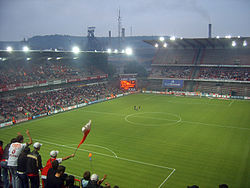| Europees kampioenschap voetbal België 1972 (in Dutch) Championnat d'Europe de football Belgique 1972 (in French) Fußball-Europameisterschaft Belgien 1972 (in German) | |
|---|---|
 | |
| Tournament details | |
| Host country | Belgium |
| Dates | 14–18 June |
| Teams | 4 |
| Venue(s) | 4 (in 3 host cities) |
| Final positions | |
| Champions | |
| Runners-up | |
| Third place | |
| Fourth place | |
| Tournament statistics | |
| Matches played | 4 |
| Goals scored | 10 (2.5 per match) |
| Attendance | 121,880 (30,470 per match) |
| Top scorer(s) | |
← 1968 1976 → | |
The 1972 UEFA European Football Championship final tournament was held in Belgium. This was the fourth UEFA European Championship, held every four years and endorsed by UEFA. The final tournament took place between 14 and 18 June 1972.
Contents
- Qualification
- Qualified teams
- Venues
- Squads
- Match officials
- Final tournament
- Bracket
- Semi-finals
- Third-place play-off
- Final
- Statistics
- Goalscorers
- Awards
- References
- External links
Only four countries played in the final tournament, with the tournament consisting of the semi-finals, a third place play-off, and the final.
The hosts were only announced after the qualifying round, which meant all teams had to participate in the qualification process for the final stage. [1] Belgium was chosen among three candidates; the other bids came from England and Italy, [2] whose teams did not reach the semi-finals.
West Germany won the tournament, beating the Soviet Union 3–0 in the final, with goals coming from Gerd Müller (twice) and Herbert Wimmer at the Heysel Stadium in Brussels. [3]





